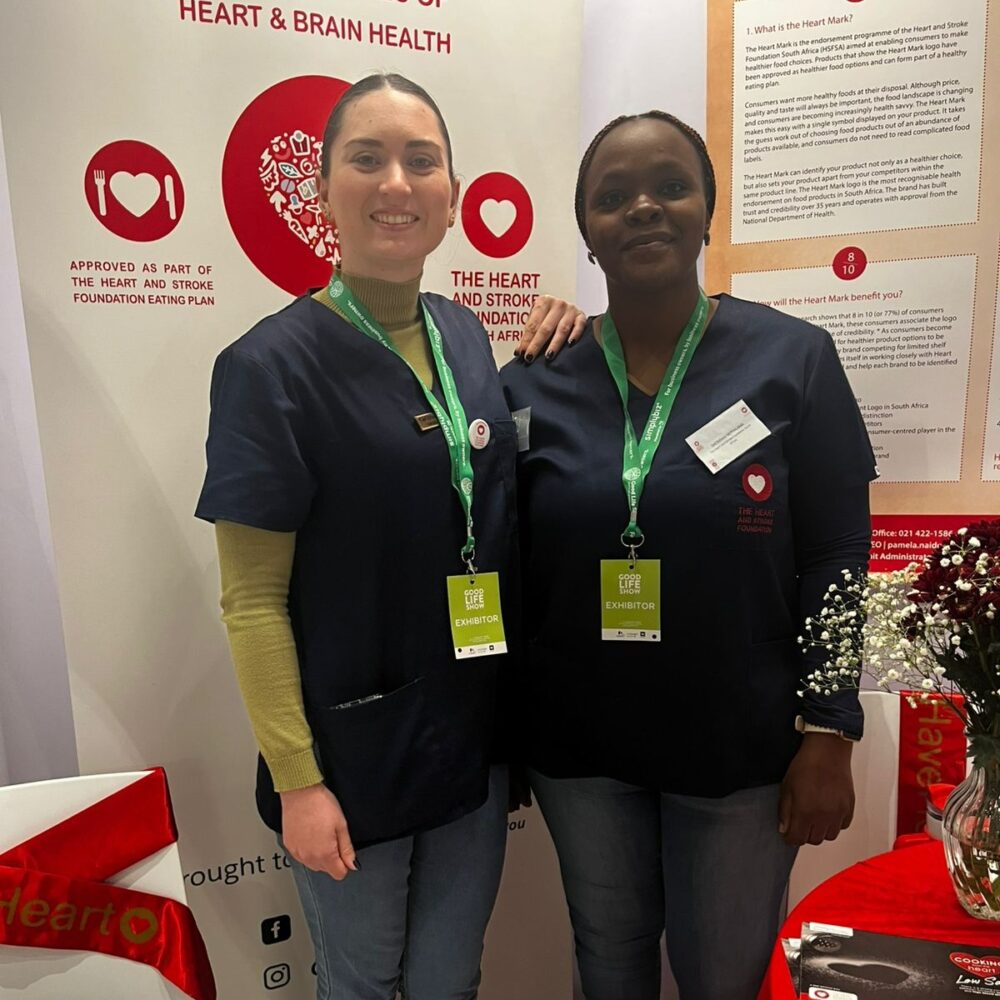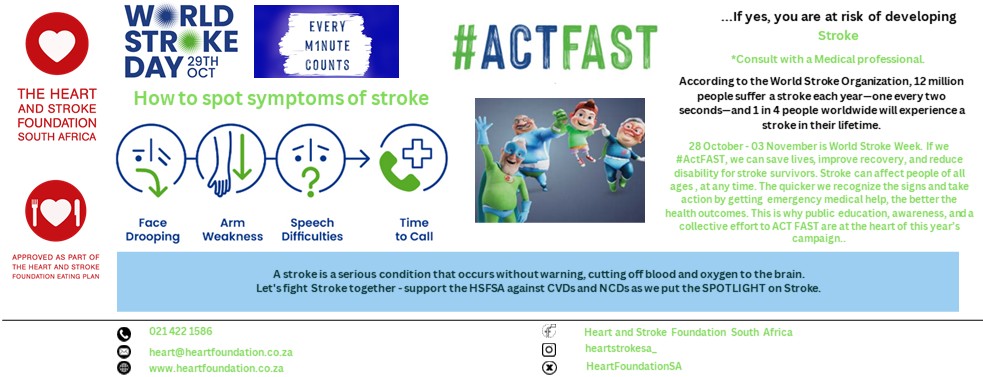The Heart and Stroke Foundation South Africa (HSFSA) will join local and global stroke organizations and their memberships in commemorating World Stroke Week (WSW) and World Stroke Day (WSD) between 28 October and 3rd November 2025. This annual campaign is one of the Foundation’s key flagship health campaigns and highlights stroke prevention strategies as well as the devastating effects of stroke when correct and timely treatment is not administered. This year’s theme, “Every Minute Counts: Let’s Act Together,” underscores the urgency of recognising stroke symptoms early and responding without delay.
Each year, 12 million people worldwide experience a stroke—approximately one every two seconds. According to the World Stroke Organization, 1 in 4 people will face a stroke in their lifetime. Strokes strike without warning, disrupting the flow of blood and oxygen to the brain. For every minute untreated, 1.9 million brain cells die, significantly raising the risk of death or long-term disability. In fact, 50% of stroke victims will not survive, and two-thirds of survivors will endure lasting complications, including difficulties with speech, movement, and daily activities. The good news is that if we #ActFAST and respond promptly, outcomes can dramatically improve — saving lives, accelerating recovery, and reducing long-term disability. Stroke response is a shared responsibility. “Let’s Act Together” calls on individuals, communities, healthcare providers, and policymakers to unite in improving education, speeding up emergency care, and supporting recovery. Stroke is a medical emergency that can affect anyone, at any age, and every second counts. It is, therefore essential to have stroke ready centres to improve stroke health outcomes.
There are essentially two types of strokes. The first is a haemorrhagic stroke which occurs when burst a blood vessel burst disrupting blood flow to the brain. The second, is an ischaemic stroke due to a blood clot. A Transient ischaemic attack (TIA), often called a “mini-stroke,” serves as a warning sign for future, more serious strokes. Strokes strike suddenly, but their causes often build silently over time. High blood pressure (hypertension) is the number one risk factor, followed by conditions such as atrial fibrillation, high cholesterol, diabetes, obesity, smoking and vaping. A 2021 review by Tribelhor et al., provides the evidence that people with hypertension are three to four times more likely to experience a stroke. In South Africa, these risks are compounded by a high prevalence of Human Immunodeficiency Virus (HIV), which can increase stroke risk, particularly among people under 50.

Recognising the early warning signs of stroke is crucial. That’s why HSFSA is urging the public to remember the FAST acronym – Face drooping, Arm weakness, Speech difficulty and Time to call emergency services immediately. Early treatment, especially in a stroke-ready centre, can reverse symptoms and prevent lifelong complications. Surviving a stroke, however, is just the beginning. Rehabilitation is key to regaining independence and quality of life. A multidisciplinary approach, including neurologists, physiotherapists, occupational therapists, speech therapists, nurses, and mental health professionals, can significantly improve recovery outcomes. But in South Africa, these services are often underutilized or delayed, especially in the public sector.
Despite its seriousness, stroke is often preventable. According to health experts, up to 80% of strokes can be avoided by managing risk factors through behaviour change: quitting smoking and vaping, quitting alcohol intake, controlling blood pressure, cholesterol and blood glucose levels, exercising regularly, and eating a healthy diet that is low is saturated fat, salt and sugar. However, prevention is not only an individual responsibility. Socioeconomic factors like poverty and limited healthcare access also play a role. The HSFSA works with communities, schools, and employers to bring education and health screenings directly to the people who need them most as part of their outreach work.
One of the HSFSA’s most innovative efforts is its partnership with FAST Heroes, a global, award-winning educational programme that teaches primary school children how to recognise stroke symptoms. Delivered through a fun and engaging five-week curriculum, the programme empowers children to act quickly in emergencies and even save lives. As part of HSFSA’s School Health Promotion Initiative (SHPI), we’re able to extend the FAST Heroes program to more schools, teachers, learners, and their families. By fostering a culture of health and wellness in schools and communities, we can support the development of healthy habits and behaviours from a young age. This initiative is an excellent example of how collaborative efforts can make a meaningful impact in the fight against stroke, ultimately promoting healthier communities and future generations who are aware, informed, and proactive.
HSFSA continues to advocate for improved access to post-stroke rehabilitation and support. Through their Mended Hearts and Stroke Support Groups (MHSGs), they provide crucial resources to survivors, caregivers, and healthcare professionals, equipping individuals with the knowledge and resources needed to navigate the complexities of stroke recovery and prevention. Additionally, HSFSA is committed to stroke prevention through proactive health risk assessment and management. The Foundation places significant emphasis on monitoring key stroke risk factors, such as high blood pressure, elevated blood sugar, and cholesterol levels, through comprehensive health risk assessments. These assessments help individuals gain a clear understanding of their personal risk profile, enabling them to make informed decisions to reduce their chances of having a stroke. Employers also play a crucial role in promoting employee health by facilitating these assessments in the workplace, fostering a healthier and more productive workforce.
Over four decades, the Foundation has reached diverse communities, creating public awareness and educating individuals and groups to understand their risk factors, recognize the warning signs of stroke, and take necessary steps timeously. This not only saves lives but also helps reduce the chances of long-term disability. In the lead-up to World Stroke Day, the Foundation is encouraging businesses, organisations, and communities to light up in green, the colour of stroke awareness, to show support for survivors and help spread the message. Prof Pamela Naidoo, CEO of HSFSA, states: “This World Stroke Week and World Stroke Day, let us unite in our efforts to create a future where everyone has access to the care they need to prevent and survive a stroke. We are particularly committed to strengthening our collaborations with the Provincial and National Departments of Health to reduce stroke-related mortality and morbidity, ensuring that timely and effective healthcare is accessible to all.”
The Foundation welcomes anyone to contact us looking for more information about strokes, cardiovascular disease and healthy behaviour modifications at our health chatline 021 422 1586 or www.heartfoundation.co.za.
